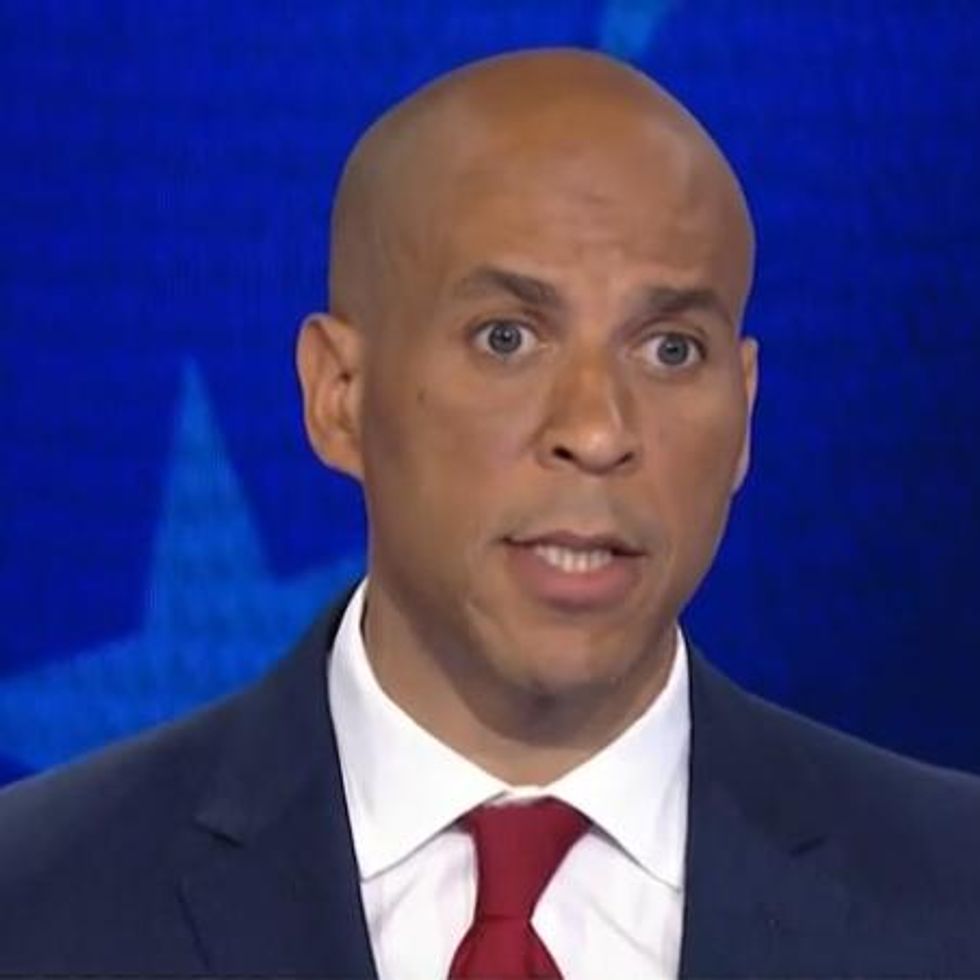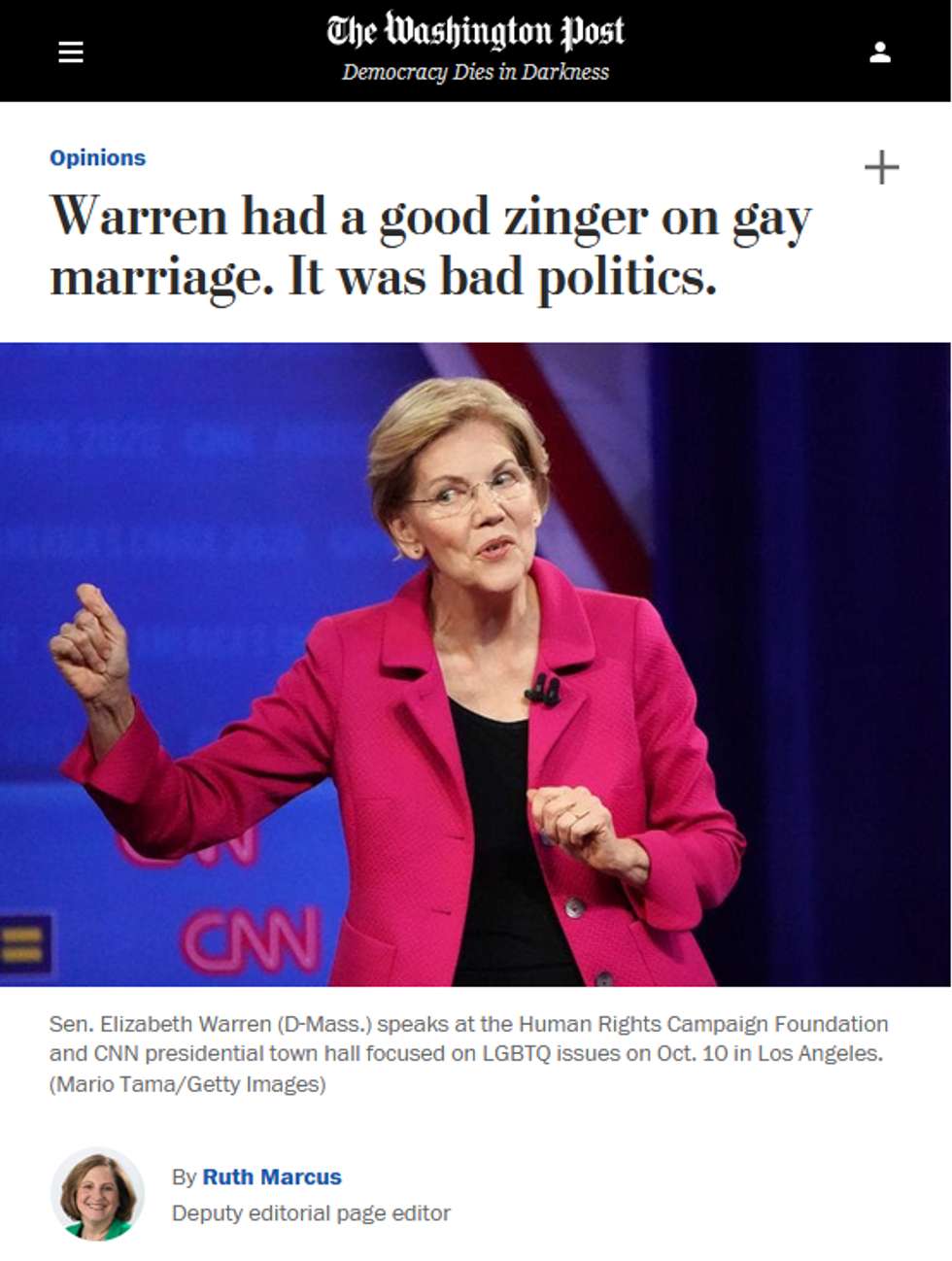LGBTQ people--and trans people in particular--have been under attack since the day Donald Trump took office and removed all mentions of LGBTQ people from several federal websites. Trump reversed federal guidance for the protection of transgender students in schools, banned trans people from military service, and has worked to exclude LGBTQ people from a variety of nondiscrimination protections. (For a full list of his administration's anti-LGBTQ actions, see here.) Trans women, especially black trans women, face what the American Medical Association recently called an "epidemic of violence" (6/10/19); the LGBTQ group Human Rights Campaign has tracked at least 21 reported murders of trans or gender nonconforming people so far this year, the vast majority of them black trans women.
Earlier this month, the Supreme Court heard arguments in three cases that will determine whether employers can discriminate against their employees on the basis of sexual orientation or gender identity. The decision could set a precedent for discrimination in areas like housing and education, and some women's rights groups are concerned that a ruling hollowing out the meaning of "sex discrimination" would harm straight, cisgender women as well (Vox, 10/8/19).
And yet, after four rounds of debates and more than 500 debate questions, moderators have asked only one question about LGBTQ issues to a Democratic presidential candidate, followed by one response opportunity given to another candidate. In the first debate, hosted by NBC (6/26/19), Chuck Todd asked Tulsi Gabbard:
One of the first things you did after launching your campaign was to issue an apology to the LGBT community about your past stances and statements on gay rights. After the Trump administration's rollbacks of civil rights protections for many in that community, why should voters in that community or voters that care about this issue in general trust you now?
After Cory Booker interrupted to challenge her response about ending discrimination, Todd gave him 30 seconds to speak on the issue. Booker tried to shift the conversation deeper than "civil rights":
Look, civil rights is someplace to begin, but in the African-American civil rights community, another place to focus on was to stop the lynching of African Americans. We do not talk enough about trans Americans, especially African-American trans Americans and the incredibly high rates of murder right now. We don't talk enough about how many children, about 30% of LGBTQ kids, who do not go to school because of fear. It's not enough just to be on the Equality Act. I'm an original co-sponsor. We need to have a president that will fight to protect LGBTQ Americans every single day from violence in America.
But NBC apparently disagreed with Booker's assessment that not enough time was being given to LGBTQ issues (and his linking of LGBTQ issues and black issues), as Maddow segued immediately to what Amy Klobuchar has "done for black and Latino voters." CNN, ABC and the New York Times seemed also to disagree: No questioner in the debates they sponsored has returned to the issue since then.
A few days after the Supreme Court arguments in the LGBTQ discrimination cases, CNN (10/10/19) broadcast a town hall on LGBTQ issues, co-sponsored by the Human Rights Campaign. Nine candidates attended--every candidate that qualified for the October debate, with the exceptions of Andrew Yang, Tulsi Gabbard and Bernie Sanders, who had canceled all events following his heart attack--and some good questions were asked.
But if the existence of the event demonstrated how far media have come on LGBTQ issues, it also demonstrated how far they still have to go. CNN's Chris Cuomo was roundly criticized for making a joke of preferred pronouns, and black and Latinx trans women protested at two points in the evening about their invisibility in the conversation.
It's safe to say that no part of the LGBTQ community is more marginalized than black trans women, who face not only disproportionate violence but also disproportionate discrimination across all areas of their lives. Yet only one black trans woman was given the mic, towards the end of the nearly five-hour event (Out, 10/13/19). (Note that in a town hall, the candidates speak one at a time, so if a question is asked once, that means only one candidate addresses it.)
Another black trans woman criticized CNN on Twitter, saying they had initially invited her to ask a question but rescinded the offer at the last minute with no explanation (Out, 10/10/19).
In an online piece about the town hall, the Washington Post's Teo Armus (10/11/19) wrote of the Cuomo pronoun debacle, "That's perhaps another sign of how LGBTQ issues have entered the mainstream this election cycle in an unprecedented fashion."
It's not clear what "entered the mainstream" could possibly mean here; it certainly doesn't mean that LGBTQ issues have gotten "mainstream" coverage. A deep dig into the Washington Post archives turns up only a small handful of print articles this election cycle that have focused on LGBTQ voters or issues, most appearing during Pride month in June. One was about Trump's anti-LGBTQ actions (6/3/19); another was about violence against trans women and only made brief mention of the elections (6/17/19); a third interviewed LGBTQ voters at Iowa's Pride Festival, where candidates had come courting (6/8/19).
A search for "LGBTQ" and "candidates" in the Nexis archive brings up 37 results at the Washington Post since June 1, most of which are brief mentions in articles about other things. (Replace "LGBTQ" with "transgender" and that falls to 21; replace it with "lesbian" and you're down to 11.) Meanwhile, "immigration" and "candidates" nets 235, and "health care" and "candidates" turns up 326.
And, in fact, Armus' piece that judged LGBTQ issues as so mainstream didn't even make it into the print edition. The two pieces the paper did publish about the CNN town hall mentioned nothing about the issues covered, instead exclusively focusing on a single cutting quip by Elizabeth Warren about what she would say to a hypothetical voter who thought marriage should be "between one man and one woman." ("I'm going to say, 'Then just marry one woman--I'm cool with that. Assuming you can find one.'")
The first, a front-page story by Annie Linskey (10/13/19), spent 1,353 words on a he said/she said debate over whether Warren demonstrated that she was "smart and snappy" or "elitist and condescending." A later column, by Ruth Marcus (10/15/19), likewise expressed no concern about the pressing issues the candidates discussed regarding the discrimination and violence LGBTQ people face, instead worrying about "intolerance and disrespect toward people of faith," and about balancing the rights of LGBTQ people to live without discrimination and the rights of those who "teach that homosexual conduct is immoral."
Many of the candidates' answers at the CNN town hall have demonstrated that they're ready to have a serious conversation about pressing LGBTQ issues--and not just in the siloed environment of a town hall. Now it's time for journalists to step up and cover these issues with the urgency they deserve, both at the debates and in their daily election coverage.






